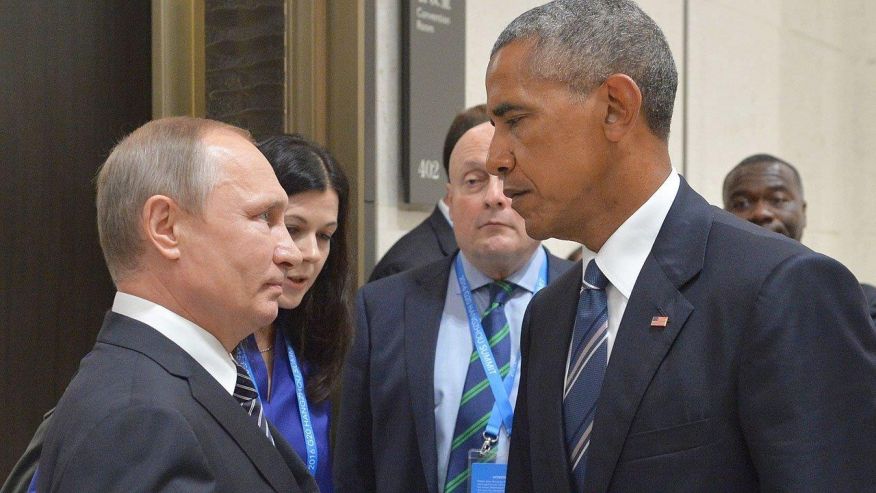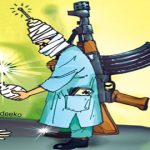Russia will not expel US diplomats in a tit-for-tat response to the White House’s decision to send home Russian officials suspected of spying, Vladimir Putin has said.
The Russian president said President Barack Obama’s decision to expel 35 suspected Russian spies in retaliation for hacking and interference in the US presidential election was a “provocation” designed to deal long term damage to relations between the two countries.
“The new unfriendly measures by the US administration are regarded as provocative, designed to further undermine relations,” Mr Putin said in a statement on the Kremlin website.
“We will not create problems for American diplomats. We will not expel anyone,” he added.
Earlier Sergei Lavrov, the foreign minister, publicly recommend that Russia expel 35 US diplomats and close down two US diplomatic compounds.
“Russia’s foreign ministry… has requested that the Russian president approve declaring as personae non gratae 31 employees of the US embassy in Moscow and four diplomats from the US consulate in Saint Petersburg,” Sergei Lavrov, the Russian foreign minister, said in televised comments.
The move would have amounted to a tit-for-tat response to American sanctions.
President Barack Obama’s said on Friday the US would expel 35 Russian diplomats and close down two diplomatic compounds in New York and Maryland in retaliation for Moscow directing hackers to interfere in the presidential elections.
The announcement provoked fury in Moscow, where many officials attacked Mr Obama personally for the move.
Dmitry Medvedev, the Russian prime minister, wrote on Twitter that the current administration was “ending its term in anti-Russian agony.”
The foreign ministry called the decision a “crushing blow to the prestige of America and its leadership.”
Maria Zakharova, a spokeswoman for the Russian foreign ministry wrote on Facebook: “Today America and the American people have been humiliated as their own President.”
The Russian Embassy in London called it “Cold War deja vu”, and said the US “wanted to destroy” ties with Moscow.
The diplomatic officials from the Russian embassy in Washington and its consulate in San Francisco were deemed “persona non grata” and told to leave the country within 72 hours.
Mr Obama said the 35 expelled diplomats were “intelligence operatives”.
He also announced it was closing two compounds owned by the Russian government, and used for intelligence operations, in New York and Maryland, from noon on Friday.
At the same time he ordered sanctions against Russia’s GRU and FSB intelligence agencies, and six named Russian individuals.
They included Lt Gen Korobov, head of the GRU, and three of his deputies. The other two were Alexei Belan and Yevgeny Bogachev, two Russians wanted by the FBI for cyber crimes for years.
Also sanctioned were three computer companies alleged to have provided “material support” to the GRU.
The developments marked an unprecedented new low in US-Russian relations under Mr Obama’s presidency.
Mr Obama accused Russia of “aggressive harassment” and said “all Americans should be alarmed by Russia’s actions”. He said hacking “could only have been directed by the highest levels of the Russian government”.
Mr Obama said: “These actions follow repeated private and public warnings that we have issued to the Russian government, and are a necessary and appropriate response to efforts to harm US interests in violation of established international norms of behaviour. Such activities have consequences.”
He added: “This is not the sum total of our response to Russia’s aggressive activities. We will continue to take a variety of actions at a time and place of our choosing, some of which will not be publicised.”
A US official added: “By imposing costs on the Russian diplomats in the United States, by denying them access to the two facilities, we hope the Russian government reevaluates its own actions.”
It was understood that Russia’s ambassador to the United States, Sergei Kislyak, will not be one of those expelled.
It comes after the the CIA and FBI concluded that Russia was responsible for hacking the Democratic Party and releasing embarrassing emails with the intention of helping Donald Trump to win the White House.
Russia has repeatedly denied the hacking accusations. A spokesman for Russia’s Foreign Ministry said: “If Washington really does take new hostile steps they will be answered. “Any action against Russian diplomatic missions in the US will immediately bounce back on US diplomats in Russia.”
Mr Trump said he would meet intelligence officials next week to hear evidence of the Russian hacking.
He said: “It’s time for our country to move on to bigger and better things.
“Nevertheless, in the interest of our country and its great people, I will meet with leaders of the intelligence community next week in order to be updated on the facts of this situation.”
Kellyanne Conway, one of Mr Trump’s top advisers, told CNN that Mr Trump stood by his claims that it was unclear whether Russia carried out the hacks and insisted that alleged Russian hacking was being used to try and delegitimise Mr Trump’s victory.
The US State Department said the expelled diplomats had been “acting in a manner inconsistent with their diplomatic or consular status”.
It also said the US actions were a response to increased harassment of US diplomats in Moscow over the last year. In 2001 the US expelled 50 Russian diplomats from the country over accusations of spying. Russia responded in kind, ordering 50 US diplomats to leave its own country.
The Russian Embassy in London added in its ‘lame duck’ memed tweet: “Everybody, including the American people, will be glad to see the last of this hapless administration.”
According to one US official there are a total of about 100 Russian spies in the US, so about one third of them are being ejected.
The compound being closed in Maryland is a sprawling coastal estate purchased by the Soviet Union in the 1970s. It is listed as the summer retreat for the Russian embassy but has been used for espionage, according to US officials.
The Kremlin accused the US of an “aggressive foreign policy” and behaving “like a bull in a china shop”.






